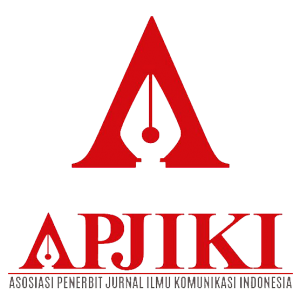Analisis Ekonomi Politik Media Dalam Pemasaran Politik Paslon Capres-Cawapres Pemilu 2024
Abstract
The 2024 General Election in Indonesia was held on Wednesday 14 February 2024, which included selecting presidential and vice presidential candidates for the 2024-2029 period. On March 20 2024, the General Election Commission has determined the winner of serial number 02 Prabowo Subianto – Gibran Rakabuming Raka. This research is a study of the political economy of the media with the case of the general election. The theories and concepts used are Eric Louw's theory of meaning formation, Moscow spatialization-structuration-commodification, and Kotler Armstrong's political marketing. The paradigm used is interpretive-critical with cultural andpolitical marketing approaches, and ethnographic methods. The research subjects are 5 categories of voters in the 2024 election, and the research object is the cultural pattern of media consumption related to political information in the 2024 election. Data collection techniques using interviews, observation, internet and literature study. This research shows 3 findings, namely: The political power of media has moved from television media, which has been categorized as the main media for disseminating political information, to social media managed by influencers who are Indonesian artists and celebrities; Digital media can be used to attract voters instantly, but it destroys social dialogue in public spaces in cyberspace. Political information on social media contains artificial information in the sense of information that is not related to politics and democracy, but determines people's choices in selecting candidates for president and vice president of Indonesia for the 2024-2029 period. This research offers a novelty concept, namely artificial political information.
Keywords
Full Text:
PDFReferences
Aprilianto, M. B. (2024). Aprilianto_Daftar Artis Pendukung Anies Prabowo Ganjar. IDN Times. https://www.idntimes.com/hype/entertainment/muhammad-bimo-aprilianto/daftar-artis-pendukung-anies-prabowo-dan-ganjar-pemilu-2024.
Aytac, U. (2024). Digital Domination: Social Media and Contestatory Democracy. Political Studies, 72(1), 6–25. https://doi.org/10.1177/00323217221096564
Boediman, E. P. (2022). Media Sosial sebagai Media Baru dalam Perspektif Praktisi Public Relations pada Era Generasi Milenial. Avant Garde, 10(02), 217–232. https://doi.org/http://dx.doi.org/10.36080/ag.v10i2.2119
Castell, M. (2010). The Rise of the Network Society (2nd ed.). Wiley-Blackwell.
Dahlia, R. R., & Permana, P. A. (2022). Oligarki Media dalam Pusaran Pemilihan Presiden dan Wakil Presiden Republik Indonesia 2019 Menuju 2024. POLITICOS: Jurnal Politik Dan Pemerintahan, 2(1), 65–81. https://doi.org/10.22225/politicos.2.1.2022.65-81
Davis, A. (n.d.). Aeron Davis.pdf (A. Davis (Ed.); Second). Polity Press.
Firdaus, M., Bakti, A. F., Johori, M. R., & Pertiwi, S. S. (2023). Political Communication of The Prime MInister of Malaysia Anwar Ibrahim on Twitter. Otoritas: Jurnal Ilmu Pengetahuan, 13(3), 364–376.
Gilardi, F., Gessler, T., Kubli, M., & Müller, S. (2022). Social Media and Political Agenda Setting. Political Communication, 39(1), 39–60. https://doi.org/10.1080/10584609.2021.1910390
Infografis Daftar Pemilih Pemilu 2024. (2023). In Berita Online. CNN Indonesia. https://www.cnnindonesia.com/nasional/20230711154230-620-972133/infografis-jumlah-pemilih-pemilu-2024-berdasarkan-usia
Kotler, P., & Amstrong, G. (n.d.). Principle of Marketing. Pearson.
Louw, E. (2001). The Media and The Cultural Production. Sage Publications.
Maryani, D., Marcellia Susan, & Ratih Hurriyati. (2020). The Influence of Image and Reputation on the Competitiveness of Political Party. International Journal of Science and Society, 2(2), 236–243. https://doi.org/10.54783/ijsoc.v2i2.115
Moscow, V. (2009). The Political Economy of Communication (Second). Sage Publication Ltd.
Muliawati, A. (2024). Pengeluaran Kampanye: AMIN Rp 49 M, Prabowo-Gibran Rp 207 M, Ganjar-Mahfud Rp 506 M. DetikNews.
Noak, P. A. (2023). Politik Hukum, Demokrasi Digital, dan Kekuasaan Partai Politik Menyongsong Pemilu 2024 di Indonesia. Jurnal Magister Hukum Udayana (Udayana Master Law Journal), Vol.12(3), 596–612. https://doi.org/10.24843/JMHU.2023.v12.i0
Ohme, J. (2019). When digital natives enter the electorate: Political social media use among first-time voters and its effects on campaign participation. Journal of Information Technology and Politics, 16(2), 119–136. https://doi.org/10.1080/19331681.2019.1613279
Ramli, Y., Imaningsih, E. S., Shiratina, A., & Soelton, M. (2021). The Implication of Digital Marketing that Influence the Political Decision to Vote. Ilomata International Journal of Management, 2(4), 282–292. https://doi.org/10.52728/ijjm.v2i4.275
W.Creswell, J., & N.Poth, C. (2018). Qualitative Inguiry Research Design:Choosing Among Five Approaches (4th Editio). Sage Publication Ltd.
Widagdo, S. (2014). Effect of Political Marketing Mix on Constituents Behavior in Selecting Candidates and Political Parties: Theoretical Studies in Legislative Elections. International Journal of Business and Management Invention ISSN, 3(10), 47–54. www.ijbmi.org
Wulandari, C. D., Muqsith, M. A., Ayuningtyas, F., Ilmu, F., Politik, I., Pembangunan, U., & Veteran, N. (2023). Fenomena Buzzer Di Media Sosial Jelang Pemilu 2024. Avant Garde : Jurnal Ilmu Komunikasi, 11(01), 134–147.
https://pemilu2024.kpu.go.id/pilpres/hitung-suara/
https://datareportal.com/reports/digital-2024-indonesia
DOI: https://doi.org/10.36080/ag.v12i1.2978
Refbacks
- There are currently no refbacks.
Copyright (c) 2024 Avant Garde

This work is licensed under a
Creative Commons Attribution-ShareAlike 4.0 International License. Visit to our university official website: www.budiluhur.ac.id





